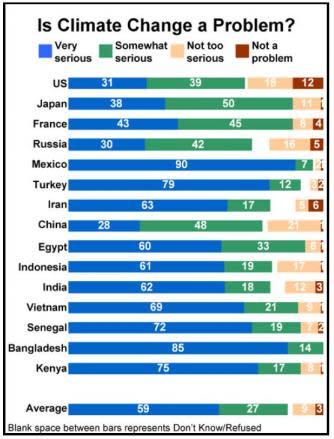Public Attitudes Toward Climate Change Across Countries-by-Naseem Sheikh
From the World Bank commissioned report in 2009: "Public attitudes toward climate change: findings from a multi-country poll",comes this interesting look at country wide attitudes to climate change.
So it's interesting to look at how these views affected country attitudes at Durban recently.
It is pertinent to mention here that Asia has been worst hit by severe climate change. Pakistan is one of the countries that have been severely hit in the recent years by disastrous effects of climate change including flash floods and devastating earthquakes.
"Developed nations are not guilty of causing the climate change that developing nations claim they are suffering," said Tom Harris, executive director of ICSC which is headquartered in Ottawa, Canada. "Climate changes all the time-both warming and cooling-due to natural causes and there is nothing that we can do to stop it. However, to the degree possible, and considering our economic circumstances, developed nations still have a moral obligation to devote a proportion of their foreign aid to helping the world's most vulnerable people adapt to natural climate events."
Human activities have caused the extinction of plants and animals at some hundreds or thousands of times faster than what the natural rate would have been as Mr. Kiyo Akasaka, Under-Secretary-General for Communications and Public Information, in the Japanese city of Kanazawa said.
"We cannot reverse extinction. We can, however, prevent future extinction of other species right now. For the next 10 years our commitment to protecting more than eight million species, and our wisdom in contributing to a balance of life, will be put to a test," Mr. Kiyo Akasaka said.
Species can adapt to gradual changes in their environment through evolution, but climate change often moves too quickly for them to do so. It's not the absolute temperature, then, but the rate of change that matters. Put simply, if climate change is large enough, quick enough, and on a global scale, it can be the perfect ingredient for a mass extinction.
We can't tell the future of evolution, but we can look at the past for reference points

